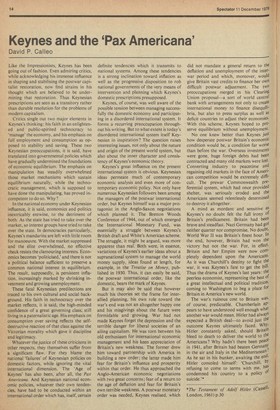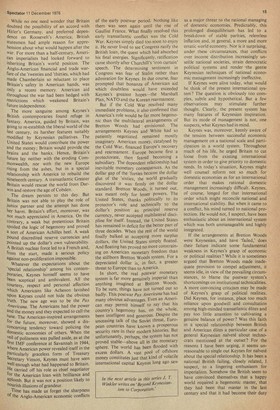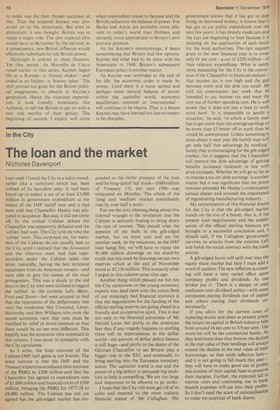Keynes and the Pax Americana'
David P. Calleo
Like the Impressionists, Keynes has been going out of fashion. Even admiring critics, while acknowledging his immense influence in shaping and stabilising the postwar capitalist restoration, now find strains in his thought which are believed to be undermining that restoration. Thus Keynesian prescriptions are seen as a transitory rather than durable resolution for the problems of modern capitalism.
Critics single out two major elements in Keynes's thinking: his faith in an enlightened and public-spirited technocracy to 'manage' the economy, and his emphasis on full employment and consumption as opposed to stability and saving. These two Keynesian preoccupations, it is said, have translated into governmental policies which have gradually undermined the foundations of economic equilibrium. The emphasis on manipulation has steadily overwhelmed those market mechanisms which sustain equilibrium naturally, while the technocratic management, which is supposed to have done the manipulating, has proved incompetent to do so. Why ?
In the national economy under Keynesian influence, it is said, economics and politics inextricably entwine, to the detriment of both. As the state has tried to take over the market, so interest groups have tried to take over the state. In democracies particularly, Keynes's mandarins are left with little room for manoeuvre. With the market suppressed and the elite overwhelmed, no effective check resists the clamouring interests. Economics becomes 'politicised,' and there is not a political balance sufficient to preserve a common national interest in equilibrium. The result, supposedly, is persistent inflation, increasingly marked by shrinking investment and growing unemployment.
These fatal Keynesian predilections are traced to his own cultural and social background. His faith in technocracy over the market reflects, it is said, the high-minded confidence of a great governing class, still living in a paternalistic age. His emphasis on consumption over saving reflects the selfdestructive reaction of that class against the Victorian morality which gave it discipline and legitimacy.
Whatever the justice of these criticisms in other respects, they themselves suffer from a significant flaw. For they blame the national 'failures' of Keynesian policies on domestic factors, while ignoring the vital international dimension. The 'Age of Keynes' has also been, after all, the Pax Americana. And Keynesian national economic policies, whatever their own tendencies, have had to be conducted within an international order which has, itself, certain definite tendencies which it transmits to national systems. Among these tendencies is a strong inclination toward inflation as well as the progressive disposition to rob national governments of the very means of intervention and planning which Keynes's domestic prescriptions presupposed.
Keynes, of course, was well aware of the possible tension between managing successfully the domestic economy and participating in a disordered international system. It forms a recurring preoccupation throughout his writing. But to what extent is today's disordered international system itself Keynesian in inspiration? The question raises interesting issues, not only about the nature and origin of the present world system, but also about the inner character and consistency of Keynes's economic theory.
Keynes's great influence on the present international system is obvious. Keynesian ideas permeate much of contemporary economic analysis and even more of contemporary economic policy. Not only have numerous Keynesian followers been among the managers of the postwar international order, but Keynes himself was a major protagonist in the Anglo-Saxon negotiations which planned it. The Bretton Woods Conference of 1944, out of which emerged the International Monetary Fund, was essentially a struggle between Keynes's British draft and White's American scheme. The struggle, it might be argued, was more apparent than real. Both were, in essence, variations of Keynes's earlier ideas about a supranational system to manage the world money supply, ideas found at length, for example, in the Treatise on Money, published in 1930. Thus, it can easily be said, the postwar international order, like the domestic, bears the mark of Keynes.
But it may also be said that however much his theories set the frame for interallied planning, his own role toward the war's end was not an altogether happy one and his misgivings about the future were formidable and growing. War had not made Keynes forget the depression and the terrible danger for liberal societies of an ailing capitalism. He was torn between his old enthusiasm for international economic management and his keen appreciation of Britain's new weakness. The former drew him toward partnership with America in building a new order; the latter made him fear for Britain's influence and prosperity within that order. He thus approached the Anglo-American economic negotiations with two great concerns; fear of a return to the age of deflation and fear for Britain's own terrible weakness. A postwar monetary order was needed, Keynes realised, which did not mandate a general return to the deflation and unemployment of the interwar period and which, moreover, would give Britain vast credits to finance her own difficult postwar adjustment. The two preoccupations merged in his Clearing Union proposal—a sort of world central bank with arrangements not only to create international money to finance disequilibria, but also to press surplus as well as deficit countries to adjust their economies. With this scheme, Keynes hoped to preserve equilibrium without unemployment.
No one knew better than Keynes just how desperate postwar Britain's economic condition would be, a condition far worse than before the war. Overseas investments were gone, huge foreign debts had been contracted and many old markets were lost. Converting industry to peacetime and regaining old markets in the face of American competition would be extremely difficult. The prewar Commonwealth preferential system, which had once provided shelter, was seriously eroded and the Americans seemed relentlessly determined to destroy it altogether.
A mind as mordant and sensitive as Keynes's no doubt felt the full irony of Britain's predicament. Britain had been brave and steadfast. Nazi Germany had got neither quarter nor compromise. No doubt, World War II was Britain's finest hour. In the end, however, Britain had won the victory but not the war. For, in effect, Britain and her Empire were now corn' pletely dependent upon the Americans. As it was Churchill's destiny to fight the war, it was Keynes's fate to get the bill. Thus the drama of Keynes's last years: the peerless economist, representing the best of a great intellectual and political tradition. coming to Washington to beg a place for Britain in America's new world.
The war's ruinous cost to Britain wa5. of course, predictable. Chamberlain al,' pears to have understood well enough what another war would mean. Hitler had always expected a British deal—to avoid just the outcome Keynes ultimately faced. Wh?1' Hitler constantly asked, should Britain bleed to death to deliver the world to the Americans? Why hadn't there been peace in 1941, after Britain had beaten Germafl)! in the air and Italy in the Mediterranean? As he sat in his bunker, awaiting the end. Hitler consoled himself: 'Churchill, hY refusing to come to terms with me, has condemned his country to a policy o' suicide.'*
While no one need wonder that Britain doubted the possibility of an accord with Hitler's Germany, and preferred depen dence on Roosevelt's America, British statesmen had ample reason for appre hension about what would happen after the war. For more than a half-century, American imperialists had looked forward to inheriting Britain's world position. The Anglo-American financial and trade warfare of the 'twenties and 'thirties, which had made Chamberlain so reluctant to place Britain's safety in American hands, was only a recent memory. American aid throughout the war had been hedged with restrictions which weakened Britain's future independence.
The more sanguine among Keynes's British contemporaries found refuge in fantasy. America, guided by Britain, was going to re-establish the liberal world of the last century, its harsher features suitably modified by Keynesian palliatives. The United States would contribute the power and the money; Britain would provide the brains and the banks. Hence, Britain's future lay neither with the eroding Commonwealth, nor with the new Europe rising from the ashes, but in a special relationship with America to rebuild the nineteenth century. A transatlantic Greater Britain would rescue the world from Darwin and restore the age of Cobden.
The dream persists to this day. But Britain was not able to play the role of JUnior partner and the attempt has done her harm. Britain's effort, moreover, was not much appreciated in America. On the contrary, a weak but pretentious Britain spoiled the logic of hegemony and proved a sort of American Achilles heel. A weak Pound discredited reserve currencies and Pointed up the dollar's own vulnerability. A British nuclear force led to a French and, from the start, made a serious policy against non-proliferation impossible.
Whatever the expectations about the sPecial relationship' among his contem POraries, Keynes himself seems to have been sceptical and ambivalent. All the courtesy, respect and personal affection Which Americans like Acheson lavished
Upon Keynes could not hide the obvious truth. The new age was to be the Pax Americana. The Americans had the power
and the money and they expected to call the tune. The American-inspired arrangements for the future, moreover, showed a dis concerting tendency toward policing the domestic economies of others. When the veil of politeness was pulled aside, as at the first IMF conference at Savannah in 1944, Where American power revealed itself in the Particularly graceless form of Treasury ecretary Vinson, Keynes must have seen well enough what had happened to Britain. He carried off his role as chief negotiator for the American loan with brilliance and aplomb. But it was not a position likely to nourish illusions of grandeur. Time has made us forget the sharpness of the Anglo-American economic conflicts of the early postwar period. Nothing like them was seen again until the rise of Gaullist France. What finally resolved this early transatlantic conflict was the Cold War. Keynes simply died too soon to enjoy it. He never lived to see Congress ratify the British loan, the quest which had absorbed his final energies. Significantly, ratification came shortly after Churchill's 'iron curtain' speech. The determining sentiment in Congress was fear of Stalin rather than admiration for Keynes. In due course, fear prompted that bonanza of American aid which doubtless would have exceeded Keynes's greatest hopes—the Marshall Plan, NATO and the Korean rearmament.
But if the Cold War resolved many immediate problems, it also confirmed that America's role would be far more hegemonic than the multilateral arrangements of Bretton Woods had envisioned. The arrangements Keynes and White had so patiently negotiated remained mostly imaginary. American money, catalysed by the Cold War, financed Europe's recovery and rearmament. Europe became first a protectorate, then feared becoming a subsidiary. The dependent relationship had inevitable monetary consequences. As the dollar gap of the 'forties became the dollar glut of the 'sixties, the world gradually discovered it was firmly on the dollar standard. Bretton Woods, it turned out, was meant only for lesser powers. The United States, thanks politically to its protector's role and technically to the dollar's position as principal reserve currency, never accepted multilateral discipline for itself. Instead, the United States has remained in deficit for the better part of three decades. When the rest of the world finally balked at accepting more surplus dollars, the United States simply floated. And floating has proved no more constraining on American monetary freedom than the stillborn Bretton Woods system. For a depreciated dollar is, in fact, a greater threat to Europe than to America.
In short, the real postwar monetary system is far more genuinely imperial than anything imagined at Bretton Woods. To be sure, things have not turned out so badly. This postwar Pax Americana has had many obvious advantages. Even an American may permit himself to say that his country's hegemony has, on the whole, been intelligent and generous. Despite the unceasing talk of the Soviet threat, European countries have known a prosperous security rare in their modern histories. But unfortunately, perhaps, the system has not proved stable—above all in the monetary sphere. The world has been flooded with excess dollars. A vast pool of offshore money constitutes just that kind of volatile international capital Keynes long ago saw
as a major threat to the rational managing of domestic economies. Predictably, this
prolonged disequilibrium has led to a breakdown of stable parities, relentless inflation and, in general, a more and more erratic world economy. Nor is it surprising, under these circumstances, that conflicts over income distribution increasingly unsettle national societies, strain democratic political systems and render ,the gentle Keynesian techniques of national economic management increasingly ineffective.
If Keynes were alive today, what would he think of the present international sys tem? The question is obviously too complex, subtle and hypothetical. But a few observations may stimulate further thought. Clearly, the present system has many features of Keynesian inspiration. But its mode of management is not, one suspects, what Keynes had in mind.
Keynes was, moreover, keenly aware of the tension between successful economic management on a national scale and parti cipation in a world system. Throughout much of his life, he urged Britain to cut loose from the existing international system in order to give priority to domestic needs. In today's situation, Keynes might well counsel reform not so much for domestic economies as for an international order that makes rational domestic management increasingly difficult. Keynes, of course, longed for that international order which might reconcile national and international stability. But when it came to a conflict, his mind turned to national protection. He would not, I suspect, have been enthusiastic about an international system which was both unmanageable and highly integrated.
If the arrangements at Bretton Woods were Keynesian, and have 'failed,' does their failure indicate some fundamental weakness in Keynes's grasp of economic or political realities? While it is sometimes argued that Bretton Woods made inade quate provision to compel adjustment, it seems idle, in view of the prevailing circum stances, to blame the postwar system's shortcomings on institutional technicalities. A more convincing criticism may be made of Keynes's grasp of political realities.
Did Keynes, for instance, place too much reliance upon goodwill and consultation among high-minded transatlantic elites and pay too little attention to cultivating a genuine balance of power? Was this faith in a special relationship between British and American elites a particular case of a general Keynesian naiveté about techno crats mentioned at the outset ? For the reasons I have been urging, it seems unreasonable to single out Keynes for naiveté about the special relationship. It has been a national British failing, closely related, I suspect, to a lingering enthusiasm for imperialism. Somehow the British seem to have convinced themselves that a happy world required a hegemonic master, that they had been that master in the last century and that it had become their duty to make way for their chosen successor in this. Thus the imperial fantasy was projected on to the Americans. But even in abdication, it was thought. Britain was to retain a major role. The new imperial elite would have to be trained by the old and, as a consequence, new British influence would effectively substitute for old British power.
Hindsight is unkind to these illusions. Yet they persist. As Marcello de Cecco noted earlier in this series, Keynes began life as a Roman--a 'history maker'—and ended as an Italian—a 'history taker.' The shift proved too great for the British political imagination to absorb in Keynes's generation. Hence the vicarious imperialism. It took friendly Americans, like Acheson, to tell the British to get on with a new role worthy of their genius. The beginning of success, I expect, will come when imperialism ceases to bemuse and the British rediscover the balance of power. For Burke and Acton are probably more relevant to today's world than Hobbes, and certainly more appropriate to Britain's own postwar position.
As for Keynes's shortcomings, it bears remembering that Britain had few options. Keynes did what had to be done with the Americans in 1944. Britain's subsequent European policy is another matter.
As Keynes was reminded at the end of his life, the economic order is made by power. Until there is a more settled and perhaps more natural balance of power within the capitalist world, economic equilibrium national or international-will continue to be elusive. That is a lesson Keynes may have learned too late to impart to his disciples.
*The Testament of Adolf Hitler (Cassell, London, 1961) p.30 In the next article in this series J. T. Winkler writes on 'Beyond Ke.vnesianism to Corporatism.'




































 Previous page
Previous page